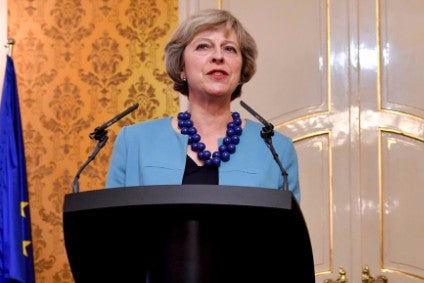
Food manufacturers and supermarkets are likely to be in the front line as the UK government draws the battle lines for a war against plastic waste.
It is aiming to eliminate plastic waste within a quarter of a century to improve the natural environment.

Discover B2B Marketing That Performs
Combine business intelligence and editorial excellence to reach engaged professionals across 36 leading media platforms.
Launching the UK government’s 25 Year Environment Plan in a speech today (11 January), Prime Minister Theresa May said plastic waste “truly is one of the great environmental scourges of our time”.
May said: “I think people will be shocked at how today we allow so much plastic to be produced needlessly.”
She suggested fruit, vegetables and other fresh foods should be sold loose instead of in plastic packaging and said the UK government will work with supermarkets to encourage them to introduce plastic-free aisles in which all food is loose.
This will give consumers the choice to make greener decisions and promote the use of less damaging plastic packaging, according to the Government.

US Tariffs are shifting - will you react or anticipate?
Don’t let policy changes catch you off guard. Stay proactive with real-time data and expert analysis.
By GlobalDataMay also said manufacturers will be targeted.
“As it is produced, we will encourage manufacturers to take responsibility for the impacts of their products and rationalise the number of different types of plastics they use,” she said.
The Government also announced plans to extend its 5p plastic bag charge to small retailers and said it is looking at potential changes to the tax system to tackle single use plastic items such as takeaway cartons.
The plans have been criticised by UK opposition parties and green groups who are angry the proposals will have no legal force. They say the plans could simply be shelved if they become inconvenient and argued the promise to stop “avoidable” plastic waste is too vague.
But industry body, the Food and Drink Federation, has expressed support for the ideas contained in the speech.
Helen Munday, its chief scientific officer, said: “We look forward to studying the details of the plan, and hope that it will sit alongside the industrial strategy in the creation of a long-term framework in which businesses can operate.
“It’s pleasing to note that the Prime Minister remains committed to an evidence-based approach to establishing the best way to deal with plastic waste and will consult widely.
“The food and drink manufacturing industry has an essential interest in protecting and enhancing the natural environment because of its reliance on a continuous, adequate supply of safe, high quality raw materials. Our members continue to show industry-leading dedication to sustainability, both individually and through our Ambition 2025, a set of collective environmental ambitions for the industry.”
But the British Takeaway Campaign has spoken out against a tax on single use plastic takeaway cartons.
Its chair, Ibrahim Dogus, said: “While we agree that more needs to be done to reduce the use of plastics, a tax isn’t the right answer, as it will lead to increased costs for consumers and hurt the many small and independent businesses that make up the UK’s takeaway sector.
“The British Takeaway Campaign will be consulting our members, such as the Foodservice Packaging Association, to explore workable alternative solutions which do not increase costs for small businesses or lead to higher prices for customers.”





